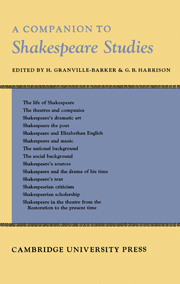Book contents
- Frontmatter
- Contents
- ILLUSTRATIONS
- Preface
- The Life of Shakespeare
- The Theatres and Companies
- Shakespeare's Dramatic Art
- Shakespeare the Poet
- Shakespeare and Elizabethan English
- Shakespeare and Music
- The National Background
- The Social Background
- Shakespeare's Sources
- Shakespeare and the Drama of his Time
- Shakespeare's Text
- Shakespearian Criticism
- Shakespearian Scholarship
- Shakespeare in the Theatre from the Restoration to the Present Time
- Reading List
- Appendices
- Index
- Plate section
Preface
Published online by Cambridge University Press: 05 August 2012
- Frontmatter
- Contents
- ILLUSTRATIONS
- Preface
- The Life of Shakespeare
- The Theatres and Companies
- Shakespeare's Dramatic Art
- Shakespeare the Poet
- Shakespeare and Elizabethan English
- Shakespeare and Music
- The National Background
- The Social Background
- Shakespeare's Sources
- Shakespeare and the Drama of his Time
- Shakespeare's Text
- Shakespearian Criticism
- Shakespearian Scholarship
- Shakespeare in the Theatre from the Restoration to the Present Time
- Reading List
- Appendices
- Index
- Plate section
Summary
The purpose of this book was first formulated in discussions between the editors in their capacities of President and Secretary of the Shakespeare Association. They were in search of a programme. The question was: what avenues of Shakespeare scholarship now most needed exploring? That led to a consideration of recent work, its sufficiency or its prospects, and that to the assembling of the present material.
During the last thirty years or so there has been not only an increase and extension of Shakespearian study, but a notable ‘transvaluation of its values’. The extension is reflected in the fourteen-fold division of this book. Not that the student of 1900, or even 1800, would find the subjects new to him, but the apparent estimate of the importance of some of them might well surprise him a little. Here, he might even say, is no study of Shakespeare at all, but a hundred thousand words or more, as much sometimes about our ignorance as our knowledge of the man, about the wretched theatre he had to work for, the clumsy habits of his printers, about his contemporaries and the circumstances, near and remote, in which the work was done; of the transcendental genius itself, no more than an echo or recounting of what has already been said. It is so. But just in this lies the present transvaluing of critical values; the latest, though it may not be the last, as Mr Eliot warns us.
- Type
- Chapter
- Information
- Companion to Shakespeare Studies , pp. ix - xPublisher: Cambridge University PressPrint publication year: 1934
- 2
- Cited by

